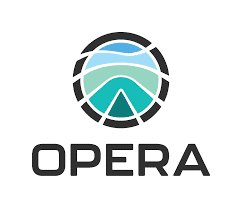A Jupyter Book of data recipes for use with Observational Products for End-Users from Remote Sensing Analysis (OPERA), Radiometric Terrain Corrected Sentinel 1 (RTC-S1) data products
"The Radiometric Terrain Corrected (RTC) SAR Backscatter product consists of radar backscatter normalized with respect to the topography. The RTC product is generated from Sentinel-1 as the input dataset and has the short name RTC-S1. The RTC-S1 product is a Level-2 product that is projected onto pre-defined UTM/Polar stereographic map projection systems. The Copernicus global 30 m (GLO-30) Digital Elevation Model (DEM) is the reference DEM used to correct for the impacts of topography and to geocode the product. The RTC product maps signals largely related to the physical properties of the ground scattering objects, such as surface roughness and soil moisture and/or vegetation. The RTC product also serves as the basis for the DSWx-S1 products. The product is provided in a GeoTIFF file format and has a posting of 30 m."
This can be accomplished with the following commands:
mamba create -n jbook -c conda-forge jupyterlab notebook ipywidgets ipympl nb_conda_kernelsmamba activate jbookpython -m pip install jupyterlab-jupyterbook-navigationjupyter lab
- Jupyter selection widgets used in the notebooks require the packages
ipywidgetsandnotebook. - In order to use multiple conda environments in Jupyter Lab at the same time, you must install
nb_conda_kernels. - Interactive matplotlib plots requires the package
ipymplin the environment running Jupyter Lab
- Install Required Software with Conda
- Rerun this step periodically. Updates to environment config files will not take effect unless you update or recreate your environment.
Explore GitHub Issues on this Jupyter Book's GitHub repository. Find solutions, add to the discussion, or start a new bug report or feature request: opensarlab_OPERA-CSLC_Recipe_Book Issues
Contact ASF User Support: [email protected]


